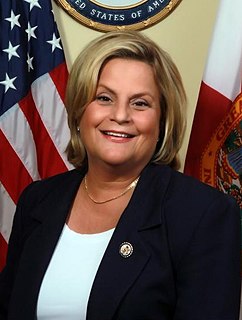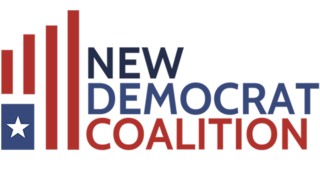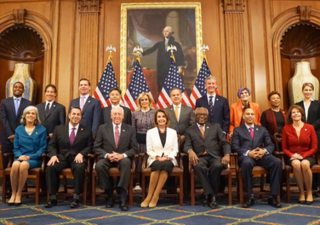
Ileana Ros-Lehtinen is a politician and lobbyist from Miami, Florida, who represented Florida's 27th congressional district from 1989 to 2019. By the end of her tenure, she was the most senior U.S. Representative from Florida. She was Chairwoman of the House Foreign Affairs Committee from 2011–2013. In 1989, Ros-Lehtinen won a special election and became the first Cuban American and Latina elected to Congress. She was also the first Republican woman elected to the House from Florida. Ros-Lehtinen gave the first Republican response to the State of the Union address in Spanish in 2011, and gave the third in 2014.

The Congressional Black Caucus (CBC) is a caucus made up of most African-American members of the United States Congress. Representative Karen Bass from California chaired the caucus from 2019 to 2021, when Representative Joyce Beatty from Ohio became its chair. As of 2021, all members of the caucus are part of the Democratic Party.

The New Democrat Coalition is a caucus in the House of Representatives of the United States Congress made up of centrist Democrats who support policies that it describes as "pro-economic growth," "pro-innovation," and "fiscally responsible." The caucus has sometimes been considered socially liberal and fiscally conservative.

The 101st United States Congress was a meeting of the legislative branch of the United States federal government, composed of the United States Senate and the United States House of Representatives. It met in Washington, DC from January 3, 1989, to January 3, 1991, during the final weeks of the administration of U.S. President Ronald Reagan and the first two years of the administration of U.S. President George H. W. Bush.

The Congressional Progressive Caucus (CPC) is a congressional caucus affiliated with the Democratic Party in the United States Congress. The CPC represents the most left-leaning, progressive faction of the Democratic Party. It was founded in 1991 and has generally grown since then.

The Congressional Hispanic Caucus (CHC) is an organization of 38 Democratic members of the United States Congress of Hispanic and Latino descent. The Caucus focuses on issues affecting Hispanics and Latinos in the United States. The CHC was founded in December 1976 as a legislative service organization of the United States House of Representatives. The CHC is organized as a Congressional Member organization, governed under the Rules of the U.S. House of Representatives.

The Congressional Asian Pacific American Caucus (CAPAC), founded on May 16, 1994 by former Congressman Norman Mineta, is a bicameral caucus consisting of members of the United States Congress who have a strong interest in promoting Asian American and Pacific Islander (AAPI) issues and advocating the concerns of Asian Americans and Pacific Islanders. While CAPAC describes itself as non-partisan, all of its current members are Democrats, though some past members, such as Joseph Cao, have been Republicans. This caucus generally includes members of East Asian, Southeast Asian, South Asian or Pacific Islander descent, members with high concentrations of Asian Americans and Pacific Islanders in their district, or those with an interest in AAPI issues.
The Cuban–American lobby describes those various groups of Cuban exiles in the United States and their descendants who have historically influenced the United States' policy toward Cuba. In general usage, this refers to anti-Castro groups.

Bonnie M. Watson Coleman is an American politician. She has served as the U.S. Representative for New Jersey's 12th congressional district since 2015. She is a member of the Democratic Party. Watson Coleman served in the New Jersey General Assembly, from 1998 to 2015 for the 15th Legislative District. She is the first African-American woman to represent New Jersey in Congress.

The Congressional Hispanic Conference (CHC) is a Republican sponsored caucus in the United States Congress. Currently with eleven members, the CHC was formed in 2003, with the stated goal of promoting policy outcomes of importance to Americans of Hispanic or Latino and Portuguese descent. These priorities included support of the following: President George W. Bush and American troops in the war against terrorism; the Free Trade Agreement of the Americas (FTAA); tax relief to families and the over two million Hispanic- and Portuguese-owned small businesses; support for faith based initiatives; and, educational choice for all. The impetus behind the Conference's creation was the debate surrounding the nomination of conservative lawyer Miguel Estrada to the DC Circuit Court of Appeals. The Congressional Hispanic Conference should not be confused with the older Congressional Hispanic Caucus, which is another congressional organization populated by Democratic members of Congress.

The Congressional Taiwan Caucus is the second largest Congressional Member Organization in the United States Congress with 228 members. The caucus focuses exclusively on improving American–Taiwanese relations.
Congressional Caucus on Global Road Safety is a congressional caucus that aims to increase awareness of road safety issues within the House of Representatives. The caucus holds educational briefings to increase knowledge of the pressing matters of road safety, including the effects of international road safety on American travelers. It also works to pass related legislation through Congress.
The U.S. Congressional International Conservation Caucus, founded in September 2003, is a bipartisan congressional organization with the conviction that “the United States of America has the opportunity, the obligation and the interests to advance the conservation of natural resources for this and future generations,” and a commitment to promote U.S. leadership in public/private conservation partnerships worldwide.
The Congressional Caucus on North Macedonia and Macedonian Americans is a bi-cameral and bi-partisan group of members of Congress dedicated to maintaining and strengthening a positive and mutually beneficial relationship between the United States and North Macedonia.
The Congressional NextGen 9-1-1 Caucus, a United States Congress caucus,works to improve the 9-1-1 phone system and emergency response systems. The caucus is headed by Senators Richard Burr (R-NC) and Amy Klobuchar (D-MN) and Representatives Dan Bishop (R-NC) and Anna Eshoo (D-CA).

The Congressional Ukrainian Caucus, or the CUC, is a bipartisan caucus of the United States House of Representatives that was announced in June 1997 in Washington, D.C., nearly six years after Ukraine declared its independence. Its mission is "organize an association of Members of Congress who share a common concern for building stronger bilateral relations between Ukraine and the United States." With the cooperation with the Ukrainian American community, the Caucus serves to lend support for Ukraine, beginning with democratization efforts and market-oriented reforms, and functions as a source of information for Members of Congress regarding events in Ukraine.

The Congressional Gaming Caucus is a Congressional Member Organization within the United States House of Representatives, as approved by the Committee on House Administration.

The Congressional Constitution Caucus is a congressional caucus made up of 41 members of the United States Congress. The caucus was founded in 2005; it had 37 members the first year it was founded.

A leadership election was held by the United States House of Representatives Democratic Caucus before the beginning of the 116th United States Congress on January 3, 2019. The election determined who will be nominated by the caucus for the speakership election as well as who would occupy other leadership positions within the House Democratic Caucus. The following positions were nominated or elected on November 29: Speaker of the U.S. House of Representatives, House Majority Leader, House Majority Whip, House Assistant Majority Leader, Democratic Caucus Chair, and Democratic Caucus Vice Chair. The Democratic Congressional Campaign Committee Chair, the Policy and Communications Committee's Chair and its three Co-Chairs, Junior Caucus Representative and Freshman Class Representative were elected the next day, and a third co-chair was added to the Steering and Policy Committee by the Leader.
The Venezuela Democracy Caucus is a bi-partisan congressional group with the stated purpose of "focusing on support for the Venezuelan people, continuing to press for freedom and democracy, and imposing pressure on the regime" in the country. The caucus was created on 13 November 2019 and is co-chaired by Florida Representatives Mario Díaz-Balart (R) and Debbie Wasserman Schultz (D). Democratic Representatives Ted Deutch, Debbie Mucarsel-Powell and Donna Shalala also joined the caucus when it was founded.












